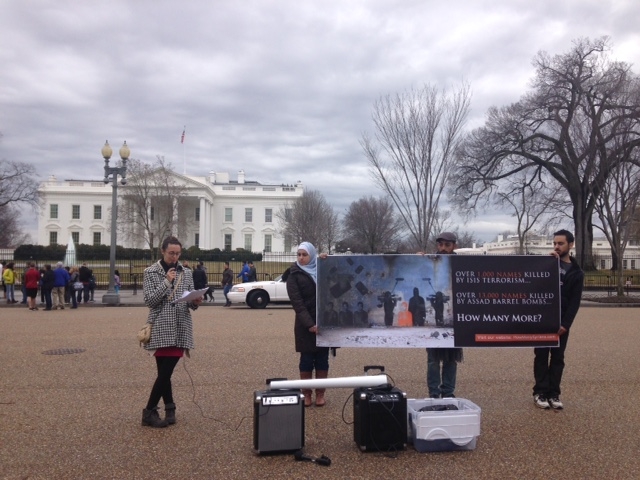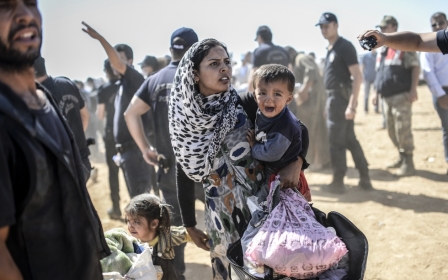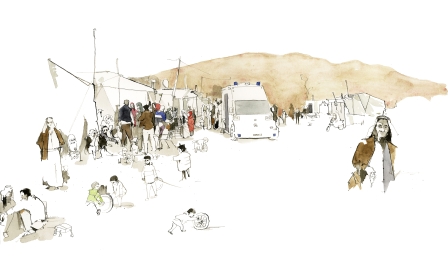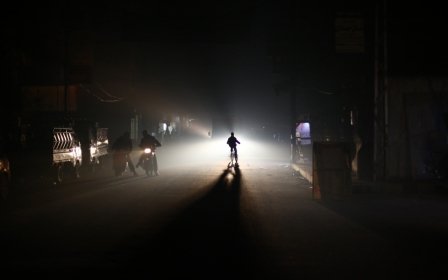The 100,000 Syrian names project that asks #howmanymore?

How do you meaningfully observe the anniversary of an ongoing conflict in which more than 220,000 people have already lost their lives?
As the Syrian civil war enters its fifth year on 15 March - the day when hundreds of Syrians took to the streets of Damascus and Aleppo in 2011 - former diplomats are offering solutions. The UN has put on a photography exhibit of tortured Syrians.
There are calls for a worldwide day of prayer and fasting, and 21 different human rights organisations have released a report chastising world powers for failing to do more to stop the growing humanitarian crisis.
A small group of Syrian and Syrian-American activists are observing this year's anniversary by tweeting - and reading aloud in front of the White House this week - the names of 100,000 Syrians from all sides of the conflict and from all areas of the country who have died this past year.
"It's really about taking a moment to remember the weight and the toll that this conflict has taken on the Syrian people and on the country as a whole," Lina Sergie Attar, one of the leaders of the project, told Middle East Eye this week. "You give every name its own space and its own time."
Attar, who was born in the US to Syrian parents who moved the family to Aleppo when she was 12, said something really powerful happens when individual names are tweeted.
"How they died and where they died and when they died - it's a kind of recording of the revolution through the history of the dead," she said.
With each tweeted name, the group asks "'how many more?" and is also encouraging social media users to engage with #howmanymore?.
"That's basically what we want people to remember with every single name: how many more people need to die for the world to understand that this conflict must end," Attar said.
The group’s list of names come from the Damascus-based Violations Documentary Centre, the same source used by the UN, and is also cross-checked with the Syrian Human Rights Network and the Syrian Observatory for Human Rights.
On Wednesday, the group, using a series of rotating volunteers, also began reading the names in front of the White House of those who have died, an activity they conducted last year which caused several very powerful moments for volunteer readers, she said.
"People would come and read names and some would recognise a name as they were reading a list. They would break down," Attar said.
Readers are encouraged, after they finish their list, to share the names of any loved ones they know who have died, and often, she said, volunteers will pull a personal list from their pocket to share.
“It’s really hard to watch and very moving,” Attar said.
Special volunteers are coming this year to read the names of their relatives or loved ones. One such reader was Molly Hock, the former roommate of Kayla Mueller. Mueller was an American human rights activist and aid worker who was held in the custody of the Islamic State group for 18 months. She was killed in a Jordanian airstrike last month.
A father has also come especially to Washington, DC this year to read the name of his son, Attar said.
“People need to remember that this is not comprehensive. These are only the names that are confirmed by name and date and location and cause of death,” she said. “Unfortunately, I don’t think we will ever know how many people have been killed in Syria because there are just so many that we have lost and we don’t even know their names.”
Middle East Eye propose une couverture et une analyse indépendantes et incomparables du Moyen-Orient, de l’Afrique du Nord et d’autres régions du monde. Pour en savoir plus sur la reprise de ce contenu et les frais qui s’appliquent, veuillez remplir ce formulaire [en anglais]. Pour en savoir plus sur MEE, cliquez ici [en anglais].




